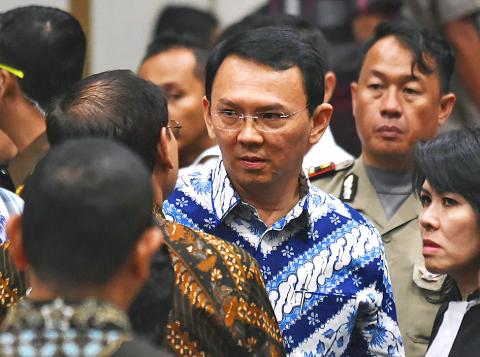Jakarta’s Christian governor was yesterday jailed for two years after being found guilty of blasphemy, in a shock decision that has stoked concerns over rising religious intolerance in the world’s most populous Muslim-majority nation.
Islamic hardliners outside the Jakarta court shouted “God is the greatest” as news came through that Basuki Tjahaja Purnama would be sent to prison for insulting Islam, a surprisingly harsh punishment after prosecutors recommended only probation.
Purnama, Jakarta’s first non-Muslim governor in half a century and its first ethnic Chinese leader, looked calm when the verdict was announced and said he would appeal, as some of his supporters in court burst into tears.

Photo: Reuters
He was immediately transferred to jail and authorities said his deputy would take over running Jakarta for the final few months of his term.
Hundreds of his supporters descended on the prison shouting “Free Ahok” — Purnama’s nickname — and shook the gate of the facility.
The 50-year-old was hauled into court last year to face trial on charges of insulting the Koran while campaigning for re-election, after the blasphemy accusations sparked a series of mass protests in Jakarta spearheaded by radical groups and encouraged by his rivals.
Yesterday’s jail sentence and his loss last month to a Muslim challenger in the Jakarta vote, which he had once been favorite to win, has fueled fears that hardliners are growing increasingly influential and that the nation’s much-vaunted tolerant brand of Islam is under threat.
“It’s another big step in the slow decline of religious freedom in Indonesia,” Human Rights Watch Indonesia researcher Andreas Harsono said after Purnama was jailed. “If someone of that political stature can be charged and sent to prison, what will happen to others?”
Indonesia, 90 percent of whose 255 million people are Muslim, has a long tradition of pluralistic values and is home to substantial populations of Christians, Hindus and Buddhists, but there has been a rise in attacks on minorities.
The five-judge panel at the Jakarta court found Purnama guilty of blasphemy after a months-long trial, in a case criticized as politically motivated.
Announcing the verdict, Presiding Judge Dwiarso Budi Santiarto said Purnama was “convincingly guilty of committing blasphemy and is sentenced to two years in prison” and ordered him to be detained.
Blasphemy carries a maximum jail term of five years in Indonesia, but the sentence was a surprise as judges typically follow the recommendation of prosecutors — in this case, they had proposed two years probation.
Analysts said the shock verdict could be a result of Purnama’s political rivals putting pressure on the nation’s notoriously corrupt judiciary to remove him from power as soon as possible.
Despite the trial, Purnama retained a loyal following in Jakarta due to his determination to clean up the traffic-clogged and polluted city, and his supporters rallied outside the court and the prison.
“Ahok is innocent and he doesn’t deserve this — he has done good things for us and the city,” said Sari Puji Astuti, 47, as she fought back tears.

MAKING WAVES: China’s maritime militia could become a nontraditional threat in war, clogging up shipping lanes to prevent US or Japanese intervention, a report said About 1,900 Chinese ships flying flags of convenience and fishing vessels that participated in China’s military exercises around Taiwan last month and in January last year have been listed for monitoring, Coast Guard Administration (CGA) Deputy Director-General Hsieh Ching-chin (謝慶欽) said yesterday. Following amendments to the Commercial Port Act (商港法) and the Law of Ships (船舶法) last month, the CGA can designate possible berthing areas or deny ports of call for vessels suspected of loitering around areas where undersea cables can be accessed, Oceans Affairs Council Minister Kuan Bi-ling (管碧玲) said. The list of suspected ships, originally 300, had risen to about

DAREDEVIL: Honnold said it had always been a dream of his to climb Taipei 101, while a Netflix producer said the skyscraper was ‘a real icon of this country’ US climber Alex Honnold yesterday took on Taiwan’s tallest building, becoming the first person to scale Taipei 101 without a rope, harness or safety net. Hundreds of spectators gathered at the base of the 101-story skyscraper to watch Honnold, 40, embark on his daredevil feat, which was also broadcast live on Netflix. Dressed in a red T-shirt and yellow custom-made climbing shoes, Honnold swiftly moved up the southeast face of the glass and steel building. At one point, he stepped onto a platform midway up to wave down at fans and onlookers who were taking photos. People watching from inside

Japan’s strategic alliance with the US would collapse if Tokyo were to turn away from a conflict in Taiwan, Japanese Prime Minister Sanae Takaichi said yesterday, but distanced herself from previous comments that suggested a possible military response in such an event. Takaichi expressed her latest views on a nationally broadcast TV program late on Monday, where an opposition party leader criticized her for igniting tensions with China with the earlier remarks. Ties between Japan and China have sunk to the worst level in years after Takaichi said in November that a hypothetical Chinese attack on Taiwan could bring about a Japanese

The WHO ignored early COVID-19 warnings from Taiwan, US Deputy Secretary of Health and Human Services Jim O’Neill said on Friday, as part of justification for Washington withdrawing from the global health body. US Secretary of State Marco Rubio on Thursday said that the US was pulling out of the UN agency, as it failed to fulfill its responsibilities during the COVID-19 pandemic. The WHO “ignored early COVID warnings from Taiwan in 2019 by pretending Taiwan did not exist, O’Neill wrote on X on Friday, Taiwan time. “It ignored rigorous science and promoted lockdowns.” The US will “continue international coordination on infectious